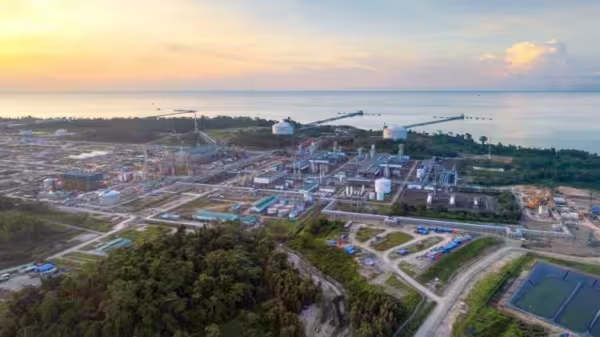bp and partners approve $7bn Tangguh UCC project in Indonesia
bp, in collaboration with its Tangguh production sharing contract partners, has announced a final investment decision for the $7 billion Tangguh Ubadari, CCUS, and Compression project (UCC) in Papua Barat, Indonesia. The initiative aims to unlock approximately 3 trillion cubic feet of additional gas resources, meeting Asia’s growing energy needs while advancing carbon capture and storage technology in the region.
The announcement was made in London during a meeting between bp’s CEO, Murray Auchincloss, and Indonesia’s President, Prabowo Subianto. Auchincloss highlighted the project as a milestone in Indonesian energy development, combining innovative gas recovery methods with carbon capture, utilization, and storage (CCUS). He emphasized bp’s longstanding commitment to Indonesia, where the company has operated for over 55 years, stating that the initiative would help address the region’s energy demands while fostering sustainability.

A first for Indonesia’s energy sector
The Tangguh UCC project will develop the Ubadari gas field, incorporate CCUS technology to enhance gas recovery, and expand onshore compression facilities. This project will leverage existing infrastructure at the Tangguh LNG plant, which increased its liquefaction capacity to 11.4 million tonnes annually following the completion of a third LNG train in 2023. The Ubadari gas field is expected to begin production in 2028.
In its initial phase, the CCUS system aims to sequester 15 million tonnes of CO2 emissions from Tangguh operations, marking it as Indonesia’s first large-scale CCUS project. The Government of Indonesia has designated the UCC project as a national strategic priority, emphasizing its importance in the country’s energy and sustainability roadmap.
Strategic and financial alignment
bp affirmed that the project aligns with its disciplined financial framework and meets its investment return benchmarks. With its strategic location, Tangguh is positioned to supply high-value energy markets in the Asia-Pacific region. The integration of CCUS in the project supports bp’s broader goal of achieving low-carbon energy solutions while maintaining operational efficiency.
The project will feature three injection wells, an offshore injection platform, an offshore CO2 pipeline, and advanced onshore facilities for CO2 removal and compression. These developments aim to reduce Tangguh’s operational emissions and contribute to Indonesia’s decarbonization goals.
Commitment to local development
The Tangguh UCC project underscores bp’s focus on fostering local workforce development. Currently, 99% of its operational workforce in Indonesia consists of Indonesians, with 70% being from Papua. The company aims to raise the representation of Papuan workers to 85% by 2029, reinforcing its role in regional economic and social development.
The Tangguh LNG plant, operated by bp, involves multiple partners, including MI Berau B.V., CNOOC Muturi Limited, Nippon Oil Exploration (Berau) Ltd., and others. bp holds a 40.22% participating interest in the project.
A landmark for Indonesia and bp
The Tangguh UCC project represents a significant step forward for Indonesia’s energy sector. It combines advanced technologies with bp’s technical expertise, setting a benchmark for sustainable gas production and carbon management in the region. With a strategic focus on long-term value, the project strengthens Indonesia’s role as a critical energy supplier to Asia-Pacific markets.
Discover more from Business-News-Today.com
Subscribe to get the latest posts sent to your email.
